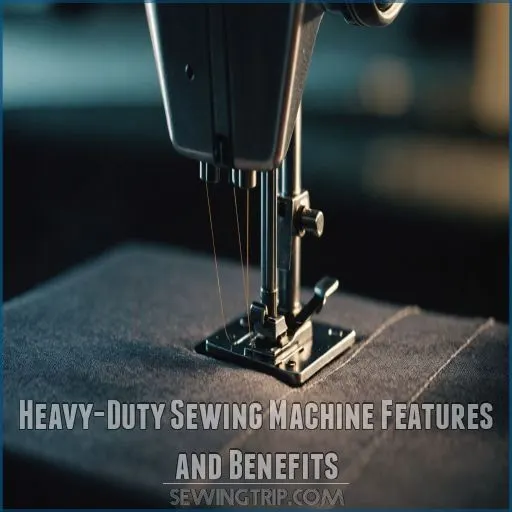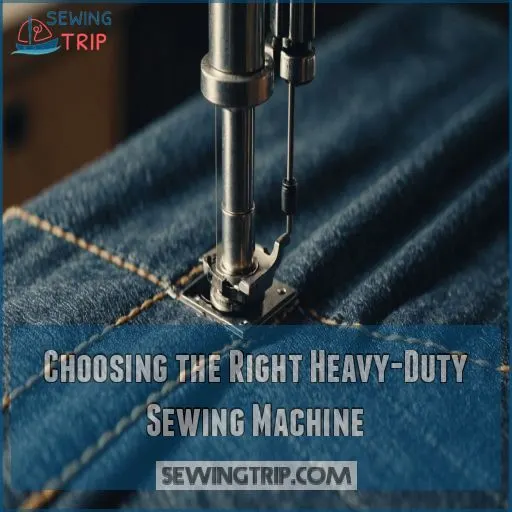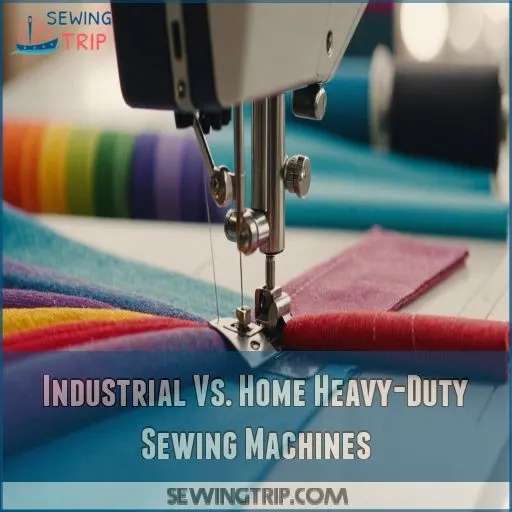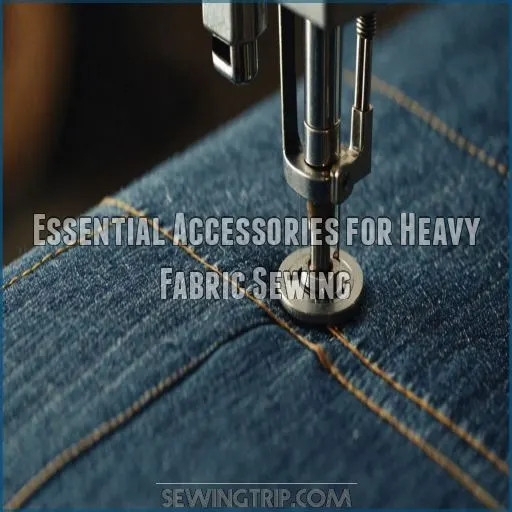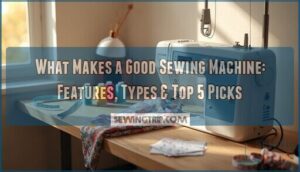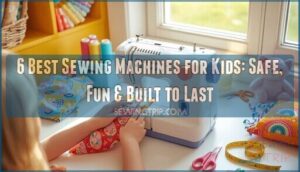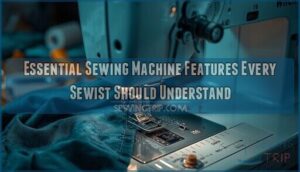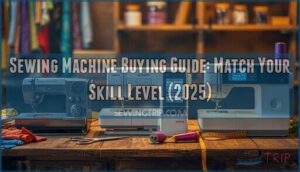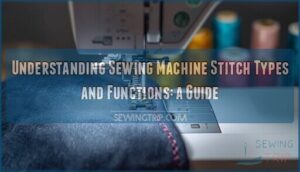This site is supported by our readers. We may earn a commission, at no cost to you, if you purchase through links.
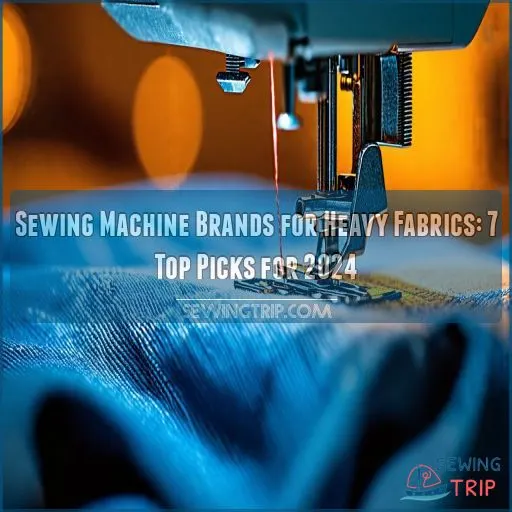
These workhorses boast sturdy metal frames, powerful motors, and a range of stitches to conquer denim, leather, and canvas.
Look for features like adjustable presser foot pressure and a walking foot to keep thick layers moving smoothly.
The Singer Heavy Duty and Brother ST371HD are popular choices, offering both muscle and versatility.
Remember, the right machine can turn a wrestling match with heavy fabric into a satisfying creative process.
But there’s more to conquering thick materials than just raw power…
Table Of Contents
Key Takeaways
- You’ll want to look for machines with robust metal frames and powerful motors—they’re the workhorses that’ll plow through layers of denim like a hot knife through butter. Don’t let thick fabrics intimidate you; with the right machine, you’ll be stitching up a storm in no time.
- It’s not just about raw power—features like adjustable presser foot pressure and walking foot attachments are your secret weapons for taming unruly fabrics. Think of them as your fabric whisperers, keeping those layers moving smoothly without a hitch.
- Don’t forget to gear up with the right accessories—heavy-duty needles and specialized presser feet are like choosing the right sword for battle. They’ll help you conquer even the toughest materials, turning your sewing projects from a wrestling match into a smooth dance.
- Remember, the perfect machine for you balances power with user-friendliness. Take some models for a test drive before committing—it’s like dating, but with less awkward small talk and more stitching. With the right heavy-duty companion, you’ll be tackling thick fabrics like a pro in no time.
Heavy-Duty Sewing Machine Features and Benefits
You’ll find heavy-duty sewing machines packed with features that make tackling tough fabrics a breeze, like the Brother ST371HD
.
From robust metal frames to powerful motors, these workhorses come equipped with everything you need to conquer denim, leather, and canvas like a pro.
Robust Metal Frame Construction
Your heavy-duty sewing machine‘s backbone is its rock-solid metal frame with commercial sewing machine
. It’s the unsung hero that keeps your stitches straight and your projects on track.
This industrial-strength foundation offers:
- Unwavering stability, even when you’re wrestling with thick fabrics
- Impressive durability that’ll outlast those flimsy plastic counterparts
- Substantial weight capacity, perfect for tackling hefty upholstery projects
Don’t let a wimpy frame hold you back. With a metal-framed powerhouse, you’ll be the master of your sewing domain.
Powerful Motors for Thick Fabrics
Powerful motors are the beating heart of heavy-duty sewing machines.
They are like the Hercules of the sewing world, flexing their muscles to punch through thick fabrics with ease.
You’ll find these powerhouses rated from 1/4 to 3/4 horsepower, each step up giving you more oomph for those chunky denims and leathers.
Some machines even boast 50% more power than standard models, turning your sewing projects into a breeze.
Wide Range of Stitch Options
Heavy-duty machines aren’t just workhorses; they’re versatile artists with a wide range of stitch options (Source).
Explore your creativity and tackle any project with ease:
- Utility stitches: Perfect for seams and hems
- Decorative patterns: Add flair to your creations
- Buttonholes: Craft professional-looking results
- Blind hems: Achieve invisible finishes
From denim to leather, you’ll have the right stitch for every fabric. It’s like having a Swiss Army knife for sewing – ready for anything!
Automatic Needle Threaders
Sewing machines equipped with automatic needle threaders are a game-changer for heavy fabric enthusiasts, especially when paired with a best heavy duty sewing machine
.
Gone are the days of squinting and fumbling with thread! This nifty feature uses a tiny hook to thread the needle’s eye in seconds.
It’s like having a miniature assistant that saves your eyes and patience. You’ll be ready to tackle those thick denims and woolens in no time, feeling like a sewing superhero with your newfound threading superpowers.
Extended Throat Space
Threading’s a breeze, but what about maneuvering those bulky quilts? Enter the extended throat space, your new best friend for large projects.
You’ll love:
- Room to wrangle denim and ease
- Freedom to roll up quilts without feeling like a contortionist
- Space for an extension table, perfect for sprawling projects
With 13"+ of elbow room, you’re the captain of your sewing ship. No more fabric wrestling matches!
7 Best Sewing Machine Brands for Heavy Fabrics
You’re about to discover seven sewing machine powerhouses that’ll make stitching heavy fabrics feel like a breeze, especially if you’re tackling projects like sails or leather bags with Sailrite’s heavy-duty machines
.
These brands have beefed up their motors, reinforced their frames, and packed in features that’ll have you sewing through leather, denim, and canvas like it’s butter.
They have essentially made the machines capable of handling heavy-duty tasks with ease, thanks to their sewing machine powerhouses.
1. Singer Heavy Duty Sewing Machine
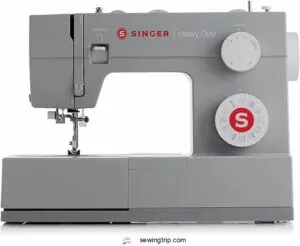
Out of the gate, Singer’s Heavy Duty line proves it’s not just another pretty face in the sewing world. You’ll feel like you’ve got superpowers with its metal frame and motor that can punch through 1,100 stitches per minute. It’s the Clark Kent of sewing machines – unassuming but packing a punch.
With its powerful motor and adjustable presser foot pressure, it’s even suitable for leather sewing projects.
With 110 stitch applications, you’re the master of your fabric destiny. The top drop-in bobbin is a game-changer, letting you keep an eye on your thread supply like a hawk. It’s not just heavy-duty; it’s your new sewing sidekick.
Best For: The Singer Heavy Duty Sewing Machine is best for sewers who are looking for a machine that can tackle tough projects like denim, canvas, and leather.
- Heavy-duty construction: The metal frame and powerful motor make this machine built to last, even with heavy-duty projects.
- Versatile stitching: With 110 stitch applications, you can tackle a wide range of projects, from basic to decorative.
- Easy bobbin management: The top drop-in bobbin system with a clear cover makes it easy to monitor your thread supply and change bobbins.
- Limited accessories: The machine comes with a limited number of feet, which may require purchasing additional accessories.
- User manual: The user manual may not be comprehensive or specific enough for some users.
- Limited heavy-duty capabilities: While the machine can handle denim and canvas, it may not be suitable for very thick vinyl or canvas.
2. Brother ST371HD Sewing Machine
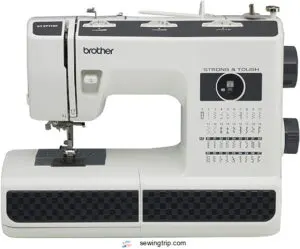
Like a trusty sidekick, the Brother ST371HD stands ready to tackle your toughest sewing challenges.
This machine lives up to its "strong and tough" moniker, boasting a durable metal plate and spring action zigzag foot that’ll have you breezing through layers of heavy fabric.
You’ll love the 37 built-in stitches for everything from blind hems to buttonholes .
Don’t let its heavyweight capabilities fool you – it’s still lightweight enough to move around easily. Just remember, while it can handle tough fabrics, you’ll need to mind your settings to keep it purring like a kitten.
Best For: The Brother ST371HD is best for sewers who need a durable machine capable of handling heavy fabrics.
- Durable metal plate and spring action zigzag foot
- 37 built-in stitches, including buttonholes and blind hems
- Lightweight enough to move around easily
- Some users have reported issues with the needle threader and presser foot lifter
- May have a burning plastic smell from the pedal
- Bobbins are a slightly different size than older Brother models
3. Janome HD3000 Heavy Duty Sewing Machine
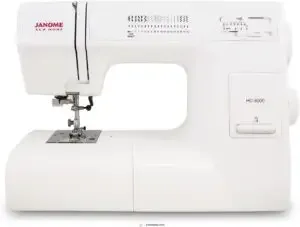
A workhorse in the sewing world, the Janome HD3000 is your trusty sidekick for tackling heavy fabrics.
You’ll love its simple design and easy-to-use features, perfect for beginners and pros alike. With 18 built-in stitches and a one-step buttonhole, you’ve got the tools to conquer any project.
The sturdy aluminum frame keeps things steady, while the adjustable presser foot pressure lets you glide through denim and leather like butter.
Don’t let its plain looks fool you – this machine’s got the muscle to handle your toughest jobs without breaking a sweat.
Best For: The Janome HD3000 is best for sewers who need a durable, easy-to-use machine for handling heavy fabrics and general sewing projects.
- Solidly constructed with a one-piece aluminum casting.
- Heavy-duty motor handles thick fabrics and tight weaves.
- Simple to use with straightforward controls.
- Not ideal for quilting or specialized techniques.
- Harp space is small, not suitable for large quilts.
- No walking foot or free motion sewing capabilities.
4. Janome Quilting Sewing Machine Bonus Kit
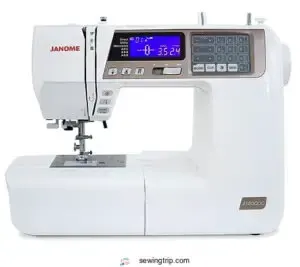
Every quilter’s dream machine has arrived in the form of the Janome Quilting Sewing Machine Bonus Kit.
You’ll be smitten with its 60 built-in stitches, including 6 one-step buttonholes. This workhorse boasts a top-loading full rotary hook bobbin and a one-hand needle threader that’ll have you stitching in no time.
With its Superior Plus Feed System, you’ll breeze through thick layers like a hot knife through butter.
The LCD screen and easy navigation keys put you in the driver’s seat, giving you full control over your creative journey.
Best For: This machine is best for quilters who want a dependable machine with a variety of stitches and features.
- Includes a variety of stitches, including buttonholes.
- Features a top-loading full rotary hook bobbin for easy threading.
- Offers a Superior Plus Feed System for smooth sewing through multiple layers.
- Some users have reported difficulty with the automatic needle threader.
- There is a slight lag time between pressing the pedal and the machine engaging.
- The machine can be difficult to use with knit fabric.
5. SINGER Quantum Stylist 9960 Sewing Machine
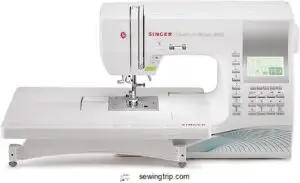
With the SINGER Quantum Stylist 9960, you’ll feel like a kid in a candy store.
This powerhouse boasts 600 built-in stitches, giving you endless creative possibilities .
You’ll breeze through projects with its 850 stitches-per-minute speed and user-friendly features like automatic threading and a top drop-in bobbin (Source).
While it might be overkill for beginners, experienced sewers will relish its capabilities.
Just be prepared to spend some quality time with the manual to master its full capabilities and achieve textile mastery.
It’s not just a sewing machine; it’s your ticket to mastering its full potential.
Best For: Experienced sewers who want a powerful machine with a wide range of features.
- A large selection of stitches, including decorative stitches, alphanumeric fonts, and buttonholes.
- Fast sewing speed and user-friendly features like automatic needle threading.
- Includes a variety of accessories and a large extension table.
- The interface for stitch settings can be a bit confusing.
- It might be too advanced for beginners.
- Doesn’t include a 1/4" seam foot.
6. Juki HZL-80HP Sewing Machine
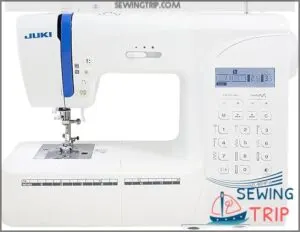
While the Juki HZL-80HP might look like a lightweight contender, it packs a serious punch for heavy fabrics. You’ll love its automatic needle threader, saving you from squinting and frustration.
This compact powerhouse boasts adjustable presser foot pressure, letting you tame even the most unruly materials.
Feeling adventurous? The free arm sewing feature is perfect for tackling those tricky collars and cuffs.
Just remember, it’s like a trusty sidekick – reliable, but not without quirks. Some users have reported struggles with customer support, so you might need to channel your inner MacGyver if issues arise.
Best For: The Juki HZL-80HP is best for beginners and sewers who want a compact and portable machine with ease-of-use features.
- Automatic needle threader and buttonholer make sewing a breeze.
- Adjustable presser foot pressure handles a variety of fabrics.
- Compact size with carrying case makes it perfect for travel.
- Customer support can be difficult to reach.
- Monogram feature may not be of the highest quality.
- Some reviewers have reported encountering defects.
7. Brother ST150HDH Sewing Machine
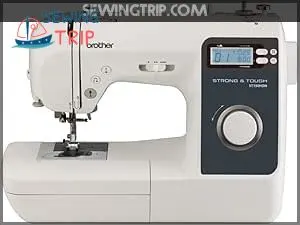
You’ll feel like a sewing superhero with the Brother ST150HDH in your arsenal.
This powerhouse machine boasts 50 built-in stitches, including 5 auto-size buttonholes, giving you the freedom to tackle any project.
It’s not just muscle; it’s brains too. The LCD screen lets you select stitches and settings with ease, while the advanced needle threader saves your eyes from squinting.
Don’t let thick fabrics intimidate you – this bad boy can handle up to six layers of denim. Ready to conquer your sewing challenges? The ST150HDH is your trusty sidekick.
Best For: The Brother ST150HDH is best for beginners and intermediate sewers looking for a durable and versatile machine.
- 50 built-in stitches, including 5 auto-size buttonholes
- LCD screen for easy stitch selection and settings
- Durable construction and 25-year limited warranty
- Limited presser foot lift height
- Some users report issues with thread jamming
- Only available in the US at 120 volts
Choosing the Right Heavy-Duty Sewing Machine
You’re eyeing a heavy-duty sewing machine, but the options are as overwhelming as a fabric store on sale day.
Let’s cut through the clutter and stitch together the key factors you’ll need to weigh, from motor power to stitch quality, so you can find your perfect match without breaking the bank or your sanity.
Assessing Your Sewing Needs
Now that you’ve got the lay of the land for heavy-duty sewing machines, let’s zero in on your specific needs.
Think of it like picking the perfect dance partner – you need one that can keep up with your moves!
Consider the fabric types you’ll be working with most often.
Are you a denim devotee or a leather lover?
Your project scale matters too – are you whipping up small repairs or tackling king-size quilts?
Comparing Motor Power and Speed
The heart of your heavy-duty sewing machine lies in its motor power and speed.
You’ll want to balance torque and stitching speed for the best performance.
DC motors offer full piercing power even at slow speeds, perfect for tackling those stubborn leather projects.
Consider machines with speed control sliders to adjust your maximum speed, giving you the freedom to topstitch with precision or zip through straight seams like a pro, controlling your stitching speed and having full piercing power.
Evaluating Stitch Quality on Thick Fabrics
Stitch quality can make or break your heavy-duty sewing project. When evaluating machines, pay close attention to stitch tension and stitch applications.
You’ll want a range of stitch applications to tackle various thick fabrics. Don’t forget about needle size and type – they’re essential for preventing fabric slippage and ensuring clean stitches.
Thread type matters too; opt for heavy-duty options that won’t snap under pressure. Remember, a higher presser foot lift gives you more wiggle room for bulky materials.
Considering Ease of Use and Maintenance
You’ve mastered those thick fabrics, but what about keeping your trusty machine purring? User-friendliness is key. Look for intuitive controls and easy-to-read labeling. A machine with simple tension adjustment and a clear troubleshooting guide can be a lifesaver.
Don’t forget about maintenance – a well-oiled machine is a happy machine. Brands with solid reputations often offer better warranty coverage and longer lifespans.
Remember, a stitch in time saves nine!
Analyzing Price Vs. Performance
Savvy sewers know that price doesn’t always dictate performance.
When comparing heavy-duty machines, consider:
- Value for money: the ratio of features to cost
- Brand reputation: reliability and customer support, with brands like Juki and Bernina offering high-quality performance at various price points see popular sewing machine brands.
- Long-term investment: durability for tackling denim and leather, with German brands like Pfaff and Köhler known for their industrial-grade machinery with careful attention to detail.
Don’t let a hefty price tag fool you – some budget-friendly options outperform their pricier counterparts. Remember, the best sewing machine is one that fits your needs and budget like a well-tailored suit.
Industrial Vs. Home Heavy-Duty Sewing Machines
You’re torn between an industrial powerhouse and a home heavy-duty machine for your thick fabric projects.
Let’s compare these two titans of stitching, exploring their strengths in durability, speed, and specialized features, so you can choose the right workhorse for your sewing room.
Durability and Longevity Comparison
In terms of durability, industrial and home heavy-duty sewing machines are like tortoises and hares, with options from top brands like best industrial sewing machines
. While both can handle tough fabrics, they’re built for different marathons.
Let’s break it down:
| Feature | Industrial | Home Heavy-Duty |
|---|---|---|
| Build | Overbuilt, all-metal parts | Sturdy, some plastic components |
| Lifespan | Decades of daily use | Years of regular use |
| Repairs | Easier, modular design | Can be complex, especially computerized models |
Industrial machines are the workhorses of the sewing world, designed for constant use. They’ll outlast your great-grandma’s fruitcake!
Home heavy-duty models, while robust, aren’t quite as indestructible but offer more versatility for DIY enthusiasts.
Speed and Efficiency Differences
In the race for stitches, industrial machines leave home heavy-duty models in the dust.
With motor power up to 3/4 horsepower, industrials clock in at breakneck speeds of 5,000+ stitches-per-minute. Your projects will fly by faster than a caffeinated tailor.
Home machines, while respectable, top out around 1,100 stitches-per-minute. For high-speed quilting or production work, industrials are the clear winners in efficiency gains and sewing speed.
Fabric Handling Capabilities
Tackling thick fabrics can be a breeze or a battle, depending on your machine’s fabric handling capabilities.
Industrial powerhouses effortlessly glide through multiple layers, while home heavy-duty machines put up a good fight. You’ll notice the difference in stitch density and tension adjustments.
Home machines might require a bit of coaxing, but don’t count them out! With the right needle size and feed dog system, you can still conquer those chunky materials like a pro.
Specialized Features for Professional Use
You’ll be sewing up a storm with these professional-grade features! Industrial machines offer a powerhouse of capabilities that’ll make your home heavy-duty machine look like child’s play.
Let’s explore the key differences:
- Industrial-grade motors: Unstoppable workhorses that’ll chew through leather like butter
- Precision stitch control: Fine-tune your stitches with surgical accuracy
- Automated thread trimming: Say goodbye to snip-happy fingers!
These features aren’t just bells and whistles; they’re your ticket to sewing nirvana.
Cost and Maintenance Considerations
Now that we’ve explored the bells and whistles, let’s talk money and upkeep. Your wallet might do a double-take when comparing industrial and home heavy-duty sewing machines. But don’t let sticker shock sew up your decision-making!
| Feature | Industrial | Home Heavy-Duty |
|---|---|---|
| Initial Cost | $$$ | $ |
| Repair Costs | Higher | Lower |
| Lifespan | 20+ years | 10-15 years |
| Warranty | Limited | Full |
| Maintenance | Weekly | Monthly |
Remember, a budget-friendly option today might unravel your long-term value. Choose wisely, and you’ll be stitching up a storm for years to come!
Essential Accessories for Heavy Fabric Sewing
You’ll need more than just a beefy machine to tackle heavy fabrics. The right accessories, from sturdy needles to specialized presser feet, can make or break your thick-material sewing projects.
Heavy-Duty Needles and Thread Selection
The right needle and thread combo can make or break your heavy-duty sewing project. Like a knight choosing their sword, you’ll want to select the perfect pair for your fabric battlefield.
- Jeans needles (sizes 90/14 to 100/16) for denim and canvas
- Leather needles with chisel points for genuine leather
- Heavy-duty thread (e.g., #80 weight jeans topstitching thread)
- Adjust thread tension (try settings 4-6) for the best stitch quality
Remember, changing your needle when switching fabrics is key to maintaining your sewing machine’s performance and achieving professional results.
Walking Foot Attachments
While heavy-duty needles and threads are the backbone of your sewing arsenal, walking foot attachments are the unsung heroes of thick fabric projects.
These nifty gadgets guarantee your layers move together smoothly, preventing puckering and misalignment.
Let’s take a look at how these feet can revolutionize your sewing game:
| Foot Type | Best For | Key Benefit |
|---|---|---|
| Standard Walking Foot | Quilting, Multiple Layers | Even Feed |
| Open-Toe Walking Foot | Visibility, Decorative Stitching | Clear View |
| Dual-Feed Walking Foot | High-Precision Work | Superior Control |
With a walking foot, you’ll feel like you’ve got superpowers – thick fabrics will bend to your will!
Specialized Presser Feet for Thick Materials
Stepping up your heavy-duty sewing game? You’ll want to stock up on specialized presser feet.
These nifty attachments are like superheroes for your thick fabrics.
For leather and vinyl, a Teflon foot glides smoothly, preventing sticking.
Tackling denim? The jeans foot #8/8D is your best friend, providing stability for those bulky seams.
Remember, matching your presser foot to your fabric thickness is key to achieving pro-level results.
Extension Tables for Large Projects
Now that you’ve got your specialized presser feet sorted, let’s tackle those big projects head-on!
Extension tables are your secret weapon for large quilt projects. They’re like giving your sewing machine a superhero cape, expanding your workspace and making fabric handling a breeze (Source).
- Increased stability for heavy fabrics
- Improved ergonomics to save your back
- Enhanced precision for intricate designs
You’ll feel like a sewing maestro, conducting your fabric symphony with newfound control and freedom.
Fabric Guides and Seam Rippers
Large projects are just the beginning.
You’ll want to add fabric guides and seam rippers to your heavy-duty sewing toolkit.
These nifty gadgets are like your personal sewing GPS, keeping you on track and saving your bacon when things go sideways.
From magnetic guides that stick to your machine to adjustable seam guides, you’ll find options to suit your style and boost your accuracy.
Frequently Asked Questions (FAQs)
What is the best sewing machine for heavy fabrics?
For heavy-duty sewing, you can’t go wrong with the Janome HD3000 or Singer Heavy Duty
These workhorses will plow through thick fabrics like butter, giving you the power and control you crave in your sewing projects.
What is a heavy duty sewing machine?
Heavy duty sewing machines are like the powerlifters of the sewing world.
They pack a punch with robust motors, metal frames, and specialized features to tackle thick fabrics.
You’ll breeze through denim, leather, and canvas like a hot knife through butter.
Are heavy-duty sewing machines a good choice?
Did you know industrial sewing machines boast 550-watt motors, dwarfing domestic 60-watt ones?
They’re powerhouses for heavy fabrics, but consider the trade-offs: limited features, noise, and size.
You’ll gain muscle, but lose some flexibility in your sewing adventures.
What fabrics can a home sewing machine handle?
Your trusty home sewing machine can handle a variety of fabrics, from lightweight cottons to denim.
It’ll happily stitch through non-stretch cotton, linen, and even light leather.
Just remember, thicker materials might require a beefier needle and adjusted tension.
Which sewing machine is best for heavy fabrics?
Ready to tackle tough fabrics?
For heavy-duty sewing, you’ll want a machine with a robust motor and strong feed dogs.
The Husqvarna Viking Emerald shines here, powering through up to 16 layers of denim with ease.
Can any sewing machine sew thick fabric?
Not all machines can tackle thick fabrics.
You’ll need a powerhouse with a robust motor, adjustable presser foot pressure, and the right needle.
Think of it like upgrading from a bicycle to a heavy-duty sewing adventure.
What is a heavy duty sewing machine?
Like a tireless workhorse, a heavy duty sewing machine powered by a reliable brushless servo motor powers through thick fabrics with ease
.
It’s built tougher, with a metal frame and stronger motor, tackling denim, leather, and multiple layers without breaking a sweat.
What is the most reliable sewing machine brand?
You’ll find Singer’s a rock-solid choice for reliability.
Their Heavy Duty line, like the 4423, has been stitching strong for 7+ years.
But don’t discount Brother or Janome – they’re stitching up a storm too.
How often should I clean my heavy-duty sewing machine?
Picture your machine as a well-oiled athlete: it needs regular care to perform.
Clean the bobbin area after each project, dust weekly, and deep clean monthly.
Don’t forget a professional tune-up every two years for peak performance.
Can I use regular thread for thick fabrics?
Regular thread can work for thick fabrics, but it’s not ideal.
For best results, use heavier thread like topstitching or jeans thread in the needle, and regular thread in the bobbin.
Adjust tension and stitch length accordingly.
What needle size works best for heavyweight materials?
Armored with the right needle, your machine can conquer even the toughest fabrics.
For heavyweight materials, opt for sizes 100 (16) or 110 (18).
These powerhouses slice through thick layers like a hot knife through butter.
How do I adjust tension for different fabric thicknesses?
Thick fabrics need higher tension (5-5), while lighter ones require lower settings (2-4) .
You’ll want to adjust gradually, testing on scrap fabric.
A balancing act is required between tension and needle size, as the right needle size is essential too.
Are special presser feet needed for heavy fabrics?
Picture conquering mountains of denim with ease.
You’ll want a walking foot for thick fabrics, while a leveling foot smooths your journey over bulky seams.
These specialized presser feet are your secret weapons for mastering heavy-duty sewing challenges.
Conclusion
Choosing the right sewing machine brands for heavy fabrics can make or break your projects.
Remember, power isn’t everything – look for a balance of strength, versatility, and user-friendly features.
Whether you’re tackling denim, leather, or canvas, the perfect machine is out there.
Don’t be afraid to test-drive a few models before committing.
With the right heavy-duty companion, you’ll be conquering thick materials like a pro in no time.
Go ahead, dream big, and let your creativity run.

